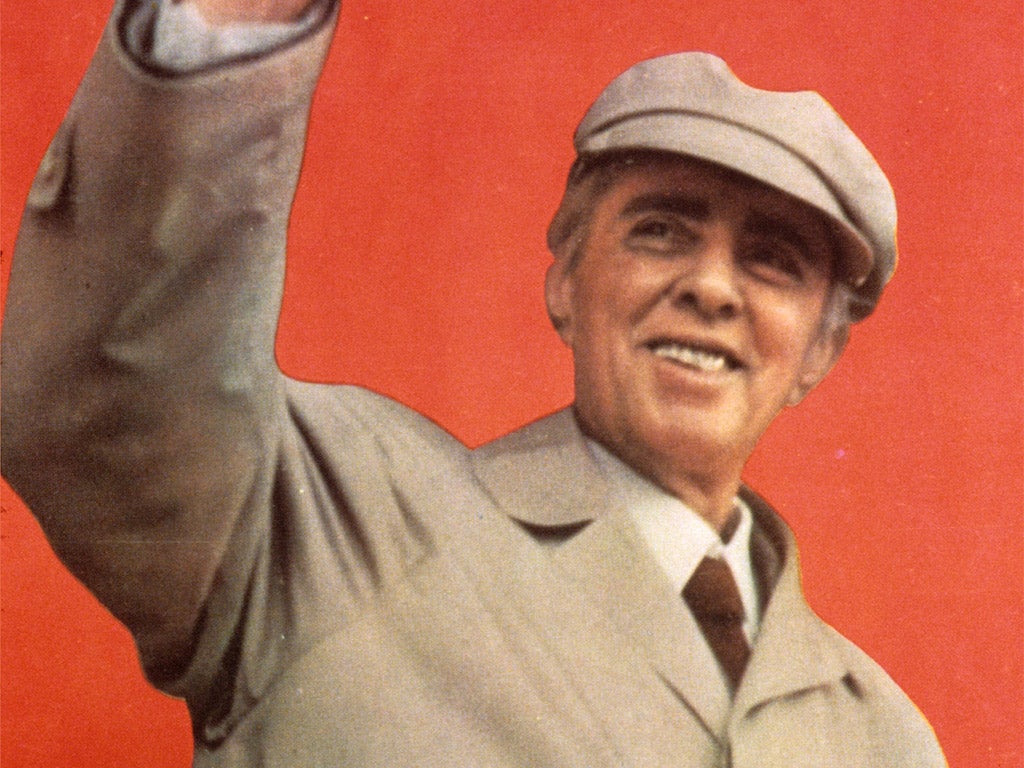Enver Hoxha: Albanian dictator quoted by Jeremy Corbyn killed up to 100,000 of his own citizens
Some self-styled Marxist Leninists believed Albania under Hoxha’s rule was the one place pure socialism was applied

During the mass CND marches of more than 30 years ago, groups travelling to London would amuse themselves by singing an absurd anthem that went “Enver Hoxha is our Leader, Happy! Happy! Happy!”
There were a tiny number of self-styled Marxist Leninists who believed that Albania under Hoxha’s iron rule was the one place left on earth where socialism in the purest form was applied in practice – but they were looked upon as an uproarious joke, even by others on the far left.
One Marxist Leninist from Wales made the pilgrimage to Tirana, the Albanian capital, met Prime Minister Mehmet Shehu, and on his way back, stayed at the hotel in Italy where honoured guests were normally put up by the Albanian government.
Unfortunately, while the visitor was in Albania, he was judged to be politically unreliable. He was consequently landed with a hotel bill that he could not pay, and had to pay his own disillusioned way back to Wales.
But Jeremy Corbyn regarded the former Albanian dictator with enough respect to be able to quote him from memory in a jokey aside when speaking to the Christmas party for Labour Party staff this week. Describing Hoxha – whose name rhymes with “lodger” – as a “tough ruler”, he quoted him as saying: “this year will be tougher than last year”.
Calling Hoxha “tough” hardly sums up the man who was the absolute ruler of his home country for more than 40 years, keeping it isolated from the rest of Europe. When the Germans withdrew from Albania in 1944, no one else was interested in invading it, so communist partisans were able to seize power. Their leader was Enver Hoxha, a teacher from a relatively prosperous background. Albania was then a neglected outpost of the old Turkish empire whose Muslim inhabitants did not even have a common language, and most of whom were illiterate. There was no industry, and no railways or universities. The largest town had a population of no more than 20,000. Hoxha ordered the closure of all mosques and churches, confiscated the land to form collective farms, had all religious leaders, landowners, and rebellious peasant wiped out, and set about modernising the economy.
His government declared allegiance to Moscow, but that allegiance was conditional. the USSR’s dictator, Joseph Stalin, did not trust Hoxha, and told the communist leaders of neighbouring Yugoslavia that they could “swallow” Albania. Hoxha’s main rival within the communist party, Koci Xoxe, was prepared to lead Albania into union with Yugoslavia, but when the Yugoslav communists fell out with Stalin in 1948, Hoxha struck.
Xoxe was killed, reputedly strangled by Mehmet Shehu. His supporters were also killed or imprisoned, and all Yugoslav advisers in Albania were deported.
When Moscow renounced Stalin and resumed relations with Yugoslavia in 1956, Hoxha denounced the Soviet leaders and switched allegiance to China. When Mao Zedong died, and his successors sought to repair relations with the rest of the communist bloc, Hoxha declared that they too were “revisionists”, and took his tiny country into total isolation.
Mehmet Shehu was Albania’s Prime Minister for 27 years until he died very suddenly in 1981. It was rumoured that Hoxha had settled an argument within the Politburo by shooting him on the spot. The official story was that he had been exposed as an American spy and had committed suicide. His corpse was uncovered 20 years later near a river outside Tirana.
Hoxha died of diabetes in 1985. The number of people killed or imprisoned during his 41 years in power may have exceeded 100,000 – equivalent to more than one thirtieth of Albania’s population.
Subscribe to Independent Premium to bookmark this article
Want to bookmark your favourite articles and stories to read or reference later? Start your Independent Premium subscription today.

Join our commenting forum
Join thought-provoking conversations, follow other Independent readers and see their replies